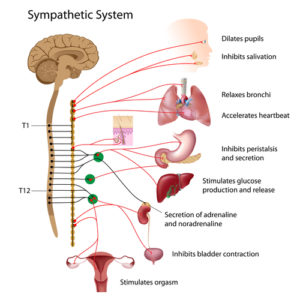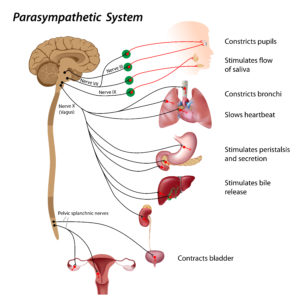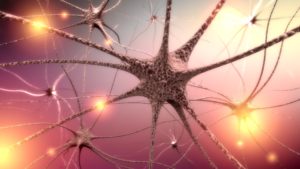Are you easily triggered? An expert in anxiety? Or like me worrying about worrying at times? Let’s talk about our biology for a minute and how we can give ourselves a reset, a discipline in divinity, serenity now. You may be what I call sympathetic nervous system dominate. We have apposing forces within us, that are at work. When in balance, it ‘s like beautiful music, and when out of balance it can be like fingernails on a chalkboard. Let me explain…
Autonomic Nervous System
You can think of this as the man behind the curtain. The guy or “system” that automatically runs the show. He does this through the vehicle of you sympathetic and parasympathetic nervous systems. You may remember these from your biology days, if you need a quick refresher here it is. Your sympathetic nervous system responds to stress. Remember the old “fight or flight” analogy? That’s your sympathetic system. The cast of characters in this system includes: your pancreas, thyroid and adrenal glands. They are fueled by cortisol and adrenaline. A necessary crew at times, but unfortunately they have been put into overdrive and they are going on strike! We know this because at an alarming rate we are suffering from fatigue, adrenal dysfunction and thyroid dysfunction. Your sympathetic nervous system is balanced by your parasympathetic nervous system. The back up crew here is the liver, kidneys, enzyme pancreas, spleen, stomach, small intestines and colon. The organ systems here are supported with parathyroid hormone, pancreatic enzymes, bile and other digestive enzymes. Ideally the body operates in a symphony, a balance, an ebb and flow of these 2 systems. Something has gone awry in our modern lifestyle and our collective illness are speaking through the vehicle of our biology to inform our spirit. Balance please, balance.


“Keeping Calm to Carry On”
If you are interested in “Keeping Calm & Carrying On”, here are a few tips. I’ll be starting with your chemistry with adaptogens and nutrition and then moving on into lifestyle and meditative practices.
Setting the stage for success. Let’s use Maslow’s Hiearchy of needs here and start with food. We have to give our body the building blocks it needs to create a balance in our neurotransmitters. Stress can activate noradrenaline in an imbalanced proportion. This is why B vitamins (B1, B6, B12) are so essential to aid in managing stress. They are a precursor for acetylcholine. Another powerful resource in the management of stress are adaptogens. Examples would include Tumeric, Rhodiola, Ashwaghanda, and Ginseng . These can be found in adaptogenic teas, adrenal supplements and smoothie powders. They work to balance our nervous system. They are a modulator and can decrease the severity of our innate defense mechanisms or the stress trigger. Think of your parasympathetic system as a bowl that can hold energy. When you have too much stress the bowl overflows with anxiety. When you have burned out your bodies stress responders, (adrenals and cortisol) then you have a partially filled bowl and experience fatigue. Adaptogens increase the size of your bowl so that you can handle stress more comfortably. So at the very least if you can’t control the external stimulus causing stress in your life, give your body every advantage in dealing with life’s circumstances in a peaceful way. What I’m saying is that with the proper adaptogens, and nutrients you can soften the bodies stress response. An incident that formerly was perceived as stressful, may now be responded to without activating the fight or flight pathway. Here’s a link to a supplement we love for adrenal restoration.

There are a host of other foods to prep your body to deal with stress in a productive way. Root vegetables contain many nutrients– including vitamin A, B-complex, vitamin C, calcium, magnesium, iron and trace minerals- that the body needs to calm an overly active sympathetic nervous system. Eat plenty of carrots, beets, yams, sweet potatoes and potatoes to help get you more grounded. Soups and stews are great options. Heat things up. Research indicates that capsaicin, the heat component of red/hot peppers, can significantly lower sympathetic responses after consumption. Pour on the hot sauce! And lastly, Chew. People that are SNS dominate generally don’t digest food well. Give your body a fighting chance by chewing every mouthful of food until it’s a liquid (at LEAST 30 times) before swallowing.


Back to the Basics
You know that little prayer before your meal, followed by the releasing breathe just before you pick up your fork? Well you just invited your parasympathetic system to activate and signal your body to “receive”. Eating on the run, in front of the computer, watching the news or multi-tasking can be a source for poor digestion and burning out your sympathetic nervous system. Find a quiet place to eat, don’t multi-task during your meals and let your body receive the nutrients.
I recently saw the movie “The Shack”. At one point the main character is sinking in a boat with black liquid substance overtaking his canoe, or at least this is what he imagines. He is invited by a divine force to simply place his attention on him. Shift your attention for just a little while and allow your experience to change. A regular steady diet of this gives our body a discipline of peace. From a biology perspective we are resetting the action potential in our nervous system. Giving our body a new set point and allowing our self to experience peace. It’s no wonder the folks who live the longest engage in a prayer and meditative practice. They simply are spiritual athletes in training. Life comes at us either way, but with this practice we are given a shield of sorts. We have to become adept at switching from our defense mechanisms to our trusting mechanisms. Our defense mechanisms have gone from protecting us to becoming our “achille’s heel”.

Meditation activates the PNS in several different ways. By relaxing, bringing attention to the body, and withdrawing attention from stress-inducing thoughts the PNS is lit up. Meditation elevates mood, decreases cortisol, strengthens the immune system and increases physical and psychological well-being. A daily meditation practice, whether 20 minutes or one minute, strengthens the PNS. Yoga not only helps strengthen the PNS, it minimizes the body’s tendency to activate the SNS. Yoga reduces levels of the stress hormone cortisol. Nutritional anthropologist Linda Knittel describes a study conducted by Thomas Jefferson Medical College in Philadelphia and the Yoga Research Society. When researchers measured the cortisol levels of participants both before and after a yoga class, they discovered a significant decrease after the class. Because yoga practices trigger the “rest and digest” system, the restorative powers of the PNS can work to bring balance to the body.

